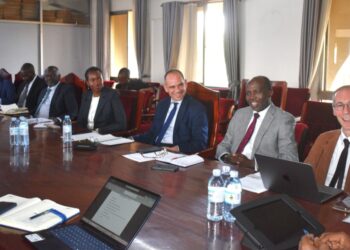KAMPALA — A complex and closely watched legal dispute involving the management and control of rental income at Plot 26 William Street, located in the heart of Kampala’s commercial centre, has taken a new turn as the High Court (Commercial Division) formally sets 23 February 2026 as the hearing date for Miscellaneous Application No. 2605 of 2025. The matter, which involves competing claims over who is legally entitled to collect rent from the multi-tenant property, has triggered a heightened sense of caution among tenants, legal practitioners, and stakeholders in the real estate industry.
A formal notice issued to tenants on 18 November 2025 draws attention to the fact that the dispute is now squarely before the High Court, invoking the doctrine of sub judice under Section 6 of the Civil Procedure Act. This legal principle restricts parties from taking any actions that may interfere with, influence, or pre-empt judicial proceedings. While some tenants initially interpreted the notice as a direct court order halting rent payments, it is important to clarify that the Court has not yet made any pronouncement on who is permitted or barred from collecting rent at this stage. Instead, the caution arises from the nature of the ongoing proceedings, which require all parties to maintain a neutral posture until the Court can consider the issues fully.
The notice therefore reflects a cautious legal environment rather than a court-issued directive, reminding tenants that transactional activities touching the subject matter of a pending case must be avoided to safeguard the fairness and integrity of the judicial process. This includes rent remittances, alterations in landlord-tenant relations, and any private arrangements that may complicate or prejudice the Court’s eventual determination.
Court Date: 23 February 2026
According to the Notice of Motion and supporting documents filed in the matter, the application will come up for hearing on 23rd February 2026 at 9:00 a.m. before the Commercial Division. On that day, the Court will hear arguments from both the Applicant and the Respondent regarding the management of rent, the status of existing arrangements, and the Applicant’s proposal for a court-supervised framework. The endorsement of the hearing date marks a significant procedural milestone, as it confirms that the Court is actively engaged with the matter and is preparing to address the substantive questions raised.
The Applicant seeks several interim remedies, including the granting of a temporary restraining order to maintain the status quo in relation to rental collections, the appointment of a Court-supervised Receiver/Manager to manage rent during the dispute, and the preservation of all rental income until the court can resolve the underlying issues in the main suit. Another key component of the Application involves a USD 100,000 Guarantee Deed, which the Applicant claims is directly connected to the management of the rental income from the property.
However, at this stage, these remain only requests. The Court has not yet considered or ruled on them. The scheduled hearing is the first opportunity for both parties to present their positions fully and for the Court to assess the merits of the arguments.
Positions of the Parties Remain Unresolved
A review of the documents filed in Court reveals that the Applicant, Sentongo Haruna, asserts that rental income from the William Street property was historically tied to the deceased’s financial obligations, particularly those arising from the USD 100,000 Guarantee Deed. The Applicant contends that the deceased proprietor had relied on rent from this specific property as a key source of funds to address the guaranteed obligations. Additionally, the Applicant argues that rent has continued to be collected privately despite the estate obligations remaining unresolved, raising concerns about accountability and transparency.
In contrast, the Respondent’s position is not yet on public record within the provided documents and is expected to be articulated during the scheduled hearing. Because the hearing has not yet taken place, the Court has not evaluated or weighed the competing claims, nor has it made any findings or conclusions regarding the rights or obligations of either side. As the law requires, both parties will be given an opportunity to present evidence, challenge assertions, and make legal arguments before any decision can be rendered.
This lack of a present determination underscores the importance of maintaining balance and neutrality. The issues remain unresolved, and the Court’s role at this stage is to listen, examine, and decide based on the evidence and legal submissions presented.
Why Tenants Were Advised to Exercise Caution
The notice issued to tenants emphasizes that, because the dispute has now been placed before the Court, any step taken involving rent payments could be interpreted as interfering with the matter. This does not mean that the Court has banned rent payments; rather, the nature of the ongoing case requires tenants to exercise discretion and avoid actions that may complicate the legal proceedings.
Legal practitioners familiar with property disputes note that this situation is not unusual. In contested property matters—particularly those involving inheritance, contractual obligations, or competing claims to control—parties often refrain from collecting rent, issuing invoices, or entering new arrangements until the Court provides guidance. Such caution protects tenants from exposure to potential future claims, including duplicate payment liabilities or disputes about whether payments were made lawfully.
The doctrine of sub judice is therefore not a judgment or a penalty but a safeguard. It ensures that justice can be achieved without one party taking steps that might alter or prejudge the rights being contested.
Awaiting the Court’s Guidance
As of now, the High Court has not declared any party the lawful rent recipient. No temporary order has been issued directing tenants to pay or not to pay rent to any particular individual. The situation remains fluid, with the judicial process yet to unfold fully. What is clear, however, is that the matter is active, procedural steps are being taken, and the Court has formally registered the issues for hearing.
Tenants and stakeholders will need to await:
1. The hearing on 23 February 2026, where both parties will be heard; and
2. The Court’s formal directions, which may clarify how rent should be handled during the dispute.
This interim period requires all parties to respect the judicial process, avoid making conclusions before the Court has had an opportunity to consider the matter, and ensure that no actions are taken that could influence or undermine the case.
What to Expect Next
The upcoming hearing is expected to provide clarity on several key issues, including:
– Whether rent should be preserved in a controlled account until final resolution;
– Whether temporary management arrangements are necessary;
– Whether the Applicant’s concerns regarding the Guarantee Deed warrant interim protections;
– How the Court intends to balance the competing rights, obligations, and interests of all parties.
The hearing will also allow the Respondent to provide a full account of their position, enabling the Court to evaluate the dispute comprehensively. Until then, the matter remains open, undecided, and firmly within the High Court’s jurisdiction.
As the legal process unfolds, the William Street property continues to operate in a climate of heightened caution. Tenants are advised to remain patient, follow legal guidance, and await the Court’s instructions once the hearing takes place.
Do you have a story in your community or an opinion to share with us: Email us at editorial@watchdoguganda.com













